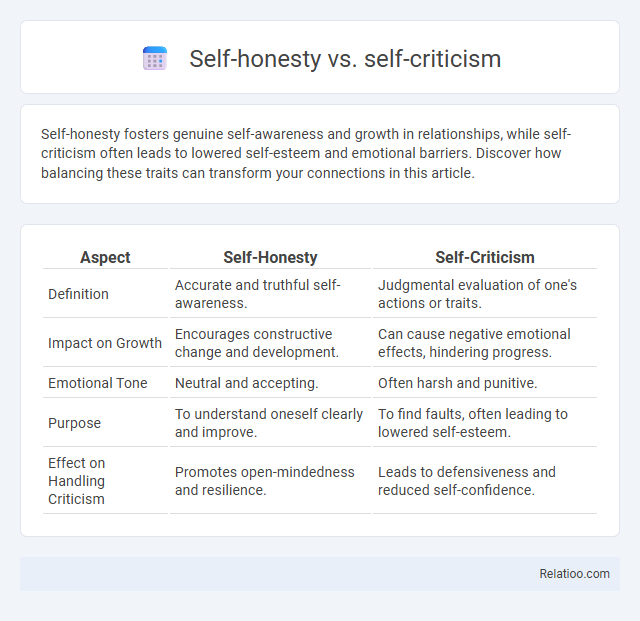Self-honesty fosters genuine self-awareness and growth in relationships, while self-criticism often leads to lowered self-esteem and emotional barriers. Discover how balancing these traits can transform your connections in this article.
Table of Comparison
| Aspect | Self-Honesty | Self-Criticism |
|---|---|---|
| Definition | Accurate and truthful self-awareness. | Judgmental evaluation of one's actions or traits. |
| Impact on Growth | Encourages constructive change and development. | Can cause negative emotional effects, hindering progress. |
| Emotional Tone | Neutral and accepting. | Often harsh and punitive. |
| Purpose | To understand oneself clearly and improve. | To find faults, often leading to lowered self-esteem. |
| Effect on Handling Criticism | Promotes open-mindedness and resilience. | Leads to defensiveness and reduced self-confidence. |
Understanding Self-Honesty: Foundations and Benefits
Self-honesty involves acknowledging one's true feelings and thoughts without distortion, fostering personal growth and emotional resilience. Unlike self-criticism, which often entails harsh judgment and negativity, self-honesty encourages constructive self-reflection and realistic self-assessment. Embracing self-honesty supports mental well-being by promoting authenticity, reducing internal conflict, and enhancing decision-making processes.
Defining Self-Criticism: Origins and Consequences
Self-criticism originates from internalized negative feedback and unrealistic personal standards, often stemming from early childhood experiences or societal pressures. This harsh self-evaluation can lead to detrimental consequences such as lowered self-esteem, increased anxiety, and impaired mental health. Differentiating self-criticism from self-honesty is crucial, as the latter promotes growth through balanced reflection, while self-criticism fosters negative judgment and emotional distress.
Self-Honesty vs Self-Criticism: Key Differences
Self-honesty involves a clear and compassionate acknowledgment of one's thoughts, feelings, and actions without distortion, fostering personal growth and emotional balance. In contrast, self-criticism often entails harsh judgment and negative self-talk that can undermine confidence and increase stress. The key difference lies in self-honesty promoting constructive self-awareness, while self-criticism tends to perpetuate negativity and inhibition.
The Impact of Self-Honesty on Personal Growth
Self-honesty fosters genuine personal growth by encouraging an accurate self-assessment and acceptance of both strengths and weaknesses, which builds emotional resilience and self-awareness. Unlike self-criticism, which often leads to decreased motivation and increased stress, self-honesty promotes constructive reflection and adaptive change. Cultivating self-honesty enhances mental well-being and supports sustained improvement by aligning actions with authentic values and goals.
How Self-Criticism Affects Mental Health
Self-criticism often exacerbates anxiety, depression, and low self-esteem by fostering persistent negative self-talk, which undermines your mental resilience. Unlike self-honesty, which encourages objective self-reflection and growth, self-criticism tends to amplify feelings of inadequacy and guilt, impairing emotional well-being. Embracing self-honesty promotes a balanced perspective that supports mental health and personal development instead of triggering harmful emotional distress.
Identifying Patterns: Are You Honest or Critical With Yourself?
Identifying patterns in your self-reflection reveals whether you practice self-honesty or self-criticism, with self-honesty focusing on objective awareness and self-compassion, while self-criticism often involves harsh judgment and negative self-talk. You benefit from cultivating self-honesty by recognizing your true emotions and behaviors without distortion, enabling growth and emotional resilience. Tracking mental habits and responses can clarify if your internal dialogue supports constructive change or fosters unnecessary guilt and stress.
Practical Strategies to Cultivate Self-Honesty
Practicing self-honesty involves recognizing your true feelings and thoughts without distortion or denial, which differs from self-criticism that often focuses on harsh judgment and negativity. Your path to cultivating self-honesty includes mindfulness exercises that enhance awareness, journaling to capture authentic experiences, and setting boundaries to honor your personal values. Embracing these practical strategies helps foster genuine self-reflection, promoting growth and emotional well-being.
Managing and Reducing Harmful Self-Criticism
Managing and reducing harmful self-criticism involves cultivating self-honesty, which encourages accurate self-assessment without harsh judgment. Self-honesty fosters awareness of personal strengths and weaknesses, creating a foundation for growth while avoiding the destructive patterns linked to excessive self-criticism. Techniques such as mindful reflection and compassionate self-talk promote healthier inner dialogue, decreasing the emotional damage caused by negative self-evaluation.
Balancing Self-Reflection: Finding the Healthy Middle Ground
Balancing self-reflection requires distinguishing self-honesty from self-criticism by embracing truthful awareness without harsh judgment, fostering personal growth and emotional well-being. You can cultivate self-honesty through mindful introspection that acknowledges flaws while encouraging constructive change, avoiding the negative spiral of excessive self-criticism. This healthy middle ground promotes resilience and self-compassion, enabling realistic self-assessment without undermining your confidence or motivation.
Building a Better Relationship with Yourself
Self-honesty involves recognizing your true feelings and thoughts without distortion, fostering genuine self-awareness essential for personal growth. Unlike self-criticism, which often leads to negative self-judgment and lowered self-esteem, self-honesty encourages compassionate reflection that promotes healing and development. Embracing self-honesty allows you to build a stronger, more authentic relationship with yourself, supporting resilience and emotional well-being.

Infographic: Self-honesty vs Self-criticism
 relatioo.com
relatioo.com